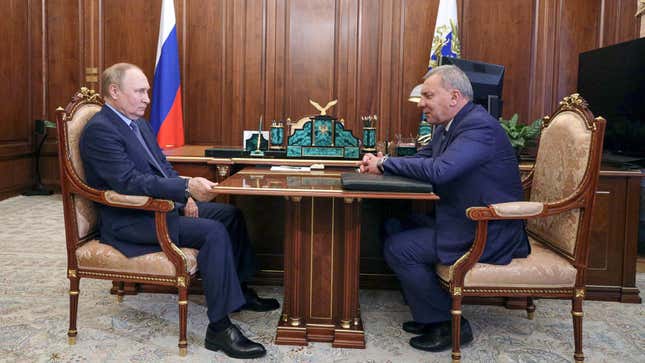
While meeting with president Vladimir Putin today, Yury Borisov, the newly appointed head of Russia’s space agency Roscosmos, said Russia will leave the International Space Station after 2024 and attend to the construction of its own orbital outpost.
The former director general of Roscosmos, Dmitry Rogozin, had previously threatened to leave the ISS on account of western sanctions, but Borisov’s comments from earlier today were meant to sound like a confirmation.
“You know that we are working within the framework of international cooperation at the International Space Station,” said Borisov during his meeting with Putin (machine translation provided by Google). “Of course, we will fulfill all our obligations to our partners, but the decision to leave this station after 2024 has been made.” To which he added: “I think that by this time we will begin to assemble the Russian orbital station.”
The development and construction of the Russian Orbital Space Station, or ROSS, will become the main priority of the Russian space program, according to Borisov. As further evidence of this, Borisov released basic schematics of the proposed space station over Telegram. According to state-run TASS, Russia’s Energia Space Rocket Corporation has been assigned the task of building the first basic model for ROSS, which will supposedly be ready in 2025. The module “will be based on a research and power unit that was previously intended for launch to the International Space Station in 2024,” added TASS.

It’s all so very dramatic, but it won’t be until the very last cosmonaut leaves the ISS for the very last time that we’ll actually believe it. Borisov’s proclamation of the nation’s imminent departure from the ISS might be a way for Russia to impose further pressure on the west to lift sanctions. NASA has previously said that “no one [ISS] partner currently has the capability to function without the other,” so this could be Russia flexing its leverage.
Launched in 1998, the ISS is a multinational collaboration between NASA, Roscosmos, the Canadian Space Agency (CSA), the European Space Agency (ESA), and the Japan Aerospace Exploration Agency (JAXA). Since the very beginning, at least one NASA astronaut and one Roscosmos cosmonaut have been aboard at the same time. The current plan is to retire the aging orbital outpost in 2030, at which time it will be deorbited and tossed into a remote part of the Pacific Ocean.
For Russia, leaving the ISS may be easier said than done. The new space chief admitted that Russia is in a “difficult” situation—a reference to international sanctions imposed on Russia for its invasions of Ukraine in 2014 and 2022. Borisov said he would strive to “raise the bar, and, first of all, to provide the Russian economy with the necessary space services,” including navigation, communications, and data transmission, among other things.
Roscosmos will be very challenged in this task, as sanctions are taking a tremendous toll on the Russian economy and supply chain, and as Putin continues to prioritize militarization over the exploration of space (Russia is reportedly diverting computer chips meant for household appliances for use in battlefield gear). During today’s meeting, Borisov said a main function of ROSS will be as an orbital lab for conducting space-related scientific research, but it’s not immediately obvious that Putin really cares for such things. That said, the Roscosmos Scientific and Technical Council has “recommended that the work on creating the technical project of Russia’s new orbital station be included in the 2025 federal space program,” according to TASS.
As to what the Russian economy will look like in three years is anyone’s guess. From my perspective, the proposed Russian space station seems like a gigantic pie in the sky. Sure, Russia can leave the ISS in a couple of years, but the country will likely have to abandon its longstanding presence in space, and I seriously doubt it wants to do that.
More: What Dmitry Rogozin’s Firing Could Mean for Russia’s Approach to Space.